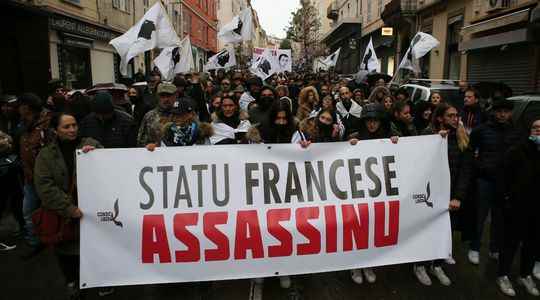Corsica is, on the opposite side, an island of striking beauty, a granite mountain covered with a green and fragrant maquis, hemmed with beaches where continentals like to come and stay in the summer, for some in their second homes. On the opposite side, a land as violent as it is beautiful, fiercely attached to its identity, its language, its culture, its history and which watches with a worried eye the demographic increase due to a positive migratory balance. And for about ten days, the island of Beauty has been transformed into an island of fire.
The spark was the attack on March 2, in Arles prison, of Yvan Colonna, sentenced to life imprisonment for the assassination of the prefect Claude Erignac in Ajaccio, in 1998. The 61-year-old man, symbol of the independence struggle, has always denied having killed. The conditions of his attack – eight minutes without any supervisor intervening -, as well as the profile of his attacker, a 35-year-old jihadist, aroused strong popular emotion in a territory where “the ideology of autonomy has won cultural hegemony, everyone is convinced that Corsica is an entity”, as sociologist Jean-Louis Fabiani points out.
In fact, since June 2021, three quarters of the benches of the territorial hemicycle have been occupied by elected autonomists and separatists. Gilles Simeoni, son of Edmond, tutelary figure of the autonomist movement, has been leading the community since 2015. Some 20% of the population also live below the poverty line.
Court partially burned down
Encouraged by former activists, demonstrations are carried by a youth, some of whom have been rocked by the myth of the clandestine armed struggle. Officially abandoned since 2014, it has suddenly reappeared in the ostentatious form of Molotov cocktails, agricultural bombs, projectile fire of all kinds, launched at the police who respond with tear gas and defense bullets. On March 9, after six hours of intense clashes, the Ajaccio court was partly set on fire.
The next day, it was the turn of the Porto-Vecchio gendarmerie to suffer the assaults, in broad daylight, from a group of young men wearing hoods. The 13th is the center of public finances in Bastia. Everywhere, shouted in the street or tagged on the walls, the radical political slogans of the 1980s and 90s, when the Corsican National Liberation Front (FLNC) was very active, have reappeared: “I Francesi Fora!” (“French outside”) and “Status English murdered!(“French state assassin”).
Gilles Simeoni, former lawyer for Yvan Colonna, incriminates the State which he deems, at least, directly responsible for the attack, for having always refused the lifting of the status of particularly reported prisoner (DPS) which prevented his bringing together the Borgo prison (Upper Corsica). In vain. A “state revenge”, according to the nationalists. “For twenty years, the Erignac affair has been hurting Corsica, it is time to turn the page, it is about the public security of the island”, underlined, very worried, Laurent Marcangeli, mayor of Ajaccio and leader of the right-wing opposition, a few hours before Matignon agreed, on March 8, to lift the DPS status, that of Yvan Colonna first then, in stride, on the 11th, after a new wave of indignation, that of the two other detainees of the “Erignac commando”, Alain Ferrandi and Pierre Alessandri.
A decision too late? In any case, it did not bring the expected relief. And this despite the calls of elected nationalists for “the opening of a new political cycle in the relations between the State and Corsica” in order to arrive, in the long term, at a reinforced autonomy. A claim supported by Regions of France in its White Paper.
Colonna as a pretext
Feeling of injustice, suspicion of a sponsored act against a compatriot, impression of contempt towards a population: the aggression of Yvan Colonna was the pretext, for this youth, to seize the torch of an armed struggle that has been reignited for several months already. Indeed, several second homes have been the subject of unclaimed attacks. However, the return of the FLNC, André Fazi, lecturer in political science at the University of Corsica, does not believe in it: “We cannot go back to the 1980s with hundreds of attacks per year committed by a structured organization, if only because the State’s surveillance capacities are too efficient.”
The disunity of the nationalist family stirs up tensions. “It’s not a flash in the pan, analyzes Jean-Louis Fabiani. There is something much deeper, a kind of growing frustration of the younger generations, governed at the territorial level by nationalists and who do not see the situation change.” Relations between the executive of Corsica and the government, initially seen as rather Girondin, have indeed continued to tense. “Denial of democracy”, according to the nationalists, and “humiliations”, the latest of which was, at the end of February, the prohibition, by a prefect about to leave, to use the Corsican language within the territorial hemicycle as it has been in use for almost forty years. Inability to negotiate and win, retort their opponents.
“On the side of the government, Corsican expectations seem never to have been considered as an important question, to the point that we could consider its elected officials as negligible despite their legitimacy”, underlines Jean-Louis Fabiani. Sunday March 13, fearing an imminent tragedy, a group of women, Pè a Noscia Ghjuventù (For our youth), called on the State to “withdraw the forces of repression, which must refuse to position themselves in front of our children”. In the middle of the presidential campaign, the government thus sees the thorny “Corsican question” rebounding.
